|
 Secure Site
Secure Site
|
 |
 What Do Dreams Mean...Kasamori Osen Ippitsusai Buncho Recent developments in dream research won’t make sense without first touching on the academic thunderbolt of 1977, when a paper by two Harvard neurophysiologists, Allan Hobson and Robert McCarley, ran in the American Journal of Psychiatry. At the time, Sigmund Freud’s theory of dreams (which holds, in part, that dreams preserve sleep by distracting the brain with reflections of the unconscious) was a pillar of psychiatry. In The Brain as a Dream State Generator: An Activation-Synthesis Hypothesis of the Dream Process, the Harvard pair challenged Freudian theory on virtually every point. They argued that dreams are nonsense created when the forebrain makes “the best of a bad job in producing even partially coherent dream imagery from the relatively noisy signals” sent up to it from the brain stem at the onset of REM. Their paper served to yank dreaming from the realms of the psychological and plonk it in a dreary, physiological bucket.
Later, the English molecular biologist Francis Crick, a co-discoverer in the 1950s of the structure of the DNA molecule, drained a little more romance from dreaming. His and theoretical biologist Graeme Mitchison’s “reverse learning” theory held that dreams rid the brain of superfluous notions, and that without this regular flushing brain overload would manifest as hallucinations and obsessions. There are echoes of this idea in the perspective of Drew Dawson, director of the University of South Australia’s Centre for Sleep Research: “I tend to think of dreaming as a bit like backwashing the swimming pool filter.”
While hugely influential, Hobson and McCarley’s Activation-Synthesis model attracted hordes of critics, who protested that many dreams aren’t merely cognitive fragments nor a succession of chaotic images, but so story-like, sequential and dramatic that the thinking brain must surely have played a more substantial role in their production than the last-minute editing of a pile of neural bloopers. And there’s the matter of lucid dreaming, in which people become aware in the course of a dream that they are, in fact, dreaming, and are able to control the course of events—a phenomenon that strengthens the case for higher-brain involvement in dream construction. The lucid dreamer can apparently apply certain techniques to prolong the dream and take it in delightful directions. “The experiences are so convincing,” says Victoria University’s Bruck, “it seems as if another level of reality exists.”
 Dreams Serve to Process Memories But the wrecking job on the notion that dreams are a random by-product of REM sleep was carried out by the South African neuroscientist and psychoanalyst Solms, who was working at the Royal London Hospital in the 1990s when he made his career-defining discoveries. Solms wasn’t alone at the time in realizing that dreaming occurred outside periods of REM, that it was also common at sleep onset and shortly before waking in the morning. But he found an even weaker spot in the Hobson-McCarley hypothesis. If their theory was right, then people with damage to a part of the brain stem called the pons—the on-off switch for REM sleep—shouldn’t be having dreams. Solms, however, had five patients with lesions in precisely that region, and while they weren’t having REM, they were nonetheless reporting dreams.
Even more interesting to Solms were 53 Royal London Hospital patients with healthy brain stems who said they’d stopped dreaming. Most of them had damage to the part of the brain that generates spatial imagery. That made sense: if you can’t create pictures in your mind, how are you going to dream? It was the circumstances of the remaining nine patients that fascinated Solms. They had damage to the white matter of the ventromesial quadrant of the frontal lobes, an area linked to the transmission of the chemical dopamine and crucially involved in motivation, urges and cravings. These patients still experienced REM sleep but reported having lost both the capacity to dream and all sense of spontaneity, drive and love of life. They did what they were told and that was about it.
It seemed to Solms that dreams must themselves be associated with driving urges—a very Freudian take—but he needed more evidence in the form of more people with lesions in this particular spot. Nowadays, damage to that part of the brain is rare, normally a result of strokes or tumors. But it was a lot more common in the ’50s and ’60s when some mental illnesses were treated by removing it in an operation called a prefrontal leukotomy. Solms waded through the literature and found hundreds of case studies in which the effects of this procedure were described. To his amazement, reported loss of dreaming was one of them. “So I thought I’d discovered something new,” says Solms, “but it turned out to be something we’d documented long ago but had forgotten.” In the field of dreams, however, his findings were no less significant for that: Solms had shown REM and dreaming to be dissociable states and produced a compelling case that the higher brain has the central role in dream creation.
Solms, who believes science is getting closer to answering the key questions about dreaming, is leading two studies at the University of Cape Town with that goal in mind. One involves using functional magnetic resonance imaging to try to disentangle the REM brain from the dreaming brain. He wants to obtain images of the dreaming/non-dreaming brain at sleep onset and note the differences between the two. “If we can image what’s going on at that point, then we’ll get a clear handle on what mechanisms are important for dreaming as opposed to REM sleep,” says Solms, who predicts a key role for the motivational part of the brain.
His other study involves comparing the sleeping ability of subjects who dream with that of subjects who can’t because of brain lesions. Solms argues that because our motivational drive is fully active while we’re asleep, our brain’s way of keeping us asleep and undertaking the necessary repairs is by tricking us, through dreams, into thinking we’re up and about and pursuing our desires. It’s the neurological equivalent of putting on a DVD for the kids so the main players in the house can get some shut-eye. “Dreams replace the real actions that are instigated by our motivational impulses while we’re awake,” Solms says. His hunch is that the non-dreamers in his study will wake up more often during the night than the dreamers, especially during REM sleep: “The dream,” he says, “is what keeps you asleep.”
Others approach dreams from a different angle. An argument that resonates with many is that whatever the explanation for dreaming, humans must do it for the same reason that all mammals have done it for more than 100 million years; any theory must make as much sense when applied to a rabbit as to a person. In the same Darwinian vein, sleeping and dreaming must serve important functions because they’re vulnerable states and natural selection would have eliminated them if they didn’t provide compensating benefits. In the ancestral environment, human life was short and perilous; ever-lurking predators threatened survival and reproductive success. The biological function of dreaming, argues Antti Revonsuo, professor of psychology at the University of Turku, Finland, is to simulate threatening events so to prepare the dreamer for recognizing and avoiding danger.
 Why do We Dream? The threat-simulation theory, first presented in 2000, “is built on the actual empirical evidence we have concerning the content of dreams,” Revonsuo says. “It’s surprising how many theories of dreaming there are that are not based on any systematic review of the evidence.” He cites studies showing that, typically, dreams are too seldom sweet, and that negative feelings, dangerous scenarios and aggression are over-represented. Based on ongoing work with PhD student Katja Valli, Revonsuo estimates that the average “non-traumatized” young adult has, conservatively, 300 threat-simulation dreams a year. In the dreams of both men and women, male strangers and wild animals are most often the enemy, and the dreamer’s typical responses are running and hiding, often in a state of terror.
If dreams are biased toward simulating ancestral threats, the traces of these biases would be strongest early in life, before the brain has adjusted to the realities of the contemporary environment. Sure enough, Revonsuo says, research shows that animals make up about 30% of all characters in the dreams of children aged 2-6 compared to 5% of adults’. True, the animals of children’s dreams are often fluffy and harmless, but almost half the time they’re frightening creatures—snakes, bears, lions, gorillas—that children would seldom, if ever, have encountered in waking life.
The reason we don’t dream about reading and writing, Revonsuo speculates in his original paper, is not because these activities don’t engage our emotions but because they’re “cultural latecomers that have [yet] to be effortlessly hammered into our evolved cognitive architecture.” Revonsuo knows that his theory pleases neither Freudians nor neuroscientists. “If, for the supporters of the psychological theories, it grants too little meaning to dreams,” he says, “for the supporters of neurophysiological random-noise theories, it grants dreaming far too much.”
Harvard’s Stickgold believes dreams have a different function entirely. “I think it’s pretty clear now that sleep and dreaming serve to process memories from the last day and all the way back,” he says. “Sleep can strengthen memories… and help extract the meaning of events by building associative networks with other memories. Dreaming is probably a high-level version of this processing.” Clearly, he adds, you don’t have to remember your dreams for these processes to work. “The brain is tuning your memory circuits as you sleep, and remembering the imagery created during this process may be fun, may be instructive, but is almost undoubtedly a freebie.”
Stickgold’s evidence includes an experiment he led in 2000 when Harvard researchers were able to elicit the same dream in a bunch of people as they drifted off to sleep. They did this by exposing 27 subjects to an intensive three-day course in the computer game Tetris, which involves assembling geometric shapes. By the second night of training, 17 subjects had reported having the same dream image—falling Tetris pieces—indicating to Stickgold that the need to learn prods the brain to dream. More of these kinds of studies are needed, he says, “because as we learn to manipulate dream content, we can start to figure out what the rules are that the brain uses in selecting material for our dreams.” Though not sold on the memory-consolidation theory, the Dream & Nightmare Laboratory’s Nielsen sees merit in it. Of course, if dreaming does embed memories it’s doing it in ways we don’t understand, he says. “Perhaps memory needs to be sliced and diced and then reassembled in odd ways in order for consolidation to be maximized.”
Psychotherapists tend to regard a lot of the research into dreaming as missing the point. Scientists, they say, can theorize all they like about dreaming’s function and physiological underpinnings, but why dreams matter is their effect on the dreamer. The man contemplating an extramarital affair dreams of the dire consequences of having one. He awakens to feel not only exquisite relief that he was dreaming but determined to walk the line. If, as Solms believes, dreams spring from the motivational part of our brain at a time when other parts that inhibit us are off-line, “it follows that there’s value in interpreting dreams,” he says. They provide a “privileged, unfiltered access” to what’s on a person’s mind. Mark Blagrove, a lecturer in psychology at the University of Wales, where he runs a sleep laboratory, thinks it’s possible the search for a biological function of dreaming could be futile. “It could just be,” he says, “that our elaborate dreams are a side effect of the fact that we have a highly evolved imagination.”
All the competing theories on why we dream may be wrong. One or more of them could be right. “I have no doubt that dreams can be enjoyable, informative, even revelatory to the dreamer,” says Harvard’s Stickgold. “But dream analysis is a more tricky question. The more dogmatic and doctrinaire the beliefs of the analyst, the less useful and potentially more destructive the analysis process becomes.” People should understand, he adds, that dreams aren’t constructed with the goal of delivering a message; they don’t have an inherent meaning. “But when you look at your dreams after you wake up… you can often feel the associative networks that were activated during dream construction, and trace them back a ways, and maybe discover a new way of looking at events in your life, of looking at yourself, at others, or at the world at large.” Maybe that’s worth a third of our lives asleep, perchance dreaming.
Boulder, Colorado—an innovative company has taken one of life’s most unpleasant experiences (being startled awake by your alarm clock early Monday morning), and transformed it into something to actually look forward to. “The Zen Alarm Clock,” uses soothing acoustic chimes that awaken users gently and gradually, making waking up a real pleasure. Rather than an artificial recorded sound played through a speaker, the Zen Clock features an alloy chime bar similar to a wind chime.
When the clock’s alarm is triggered, its chime produces a long-resonating, beautiful acoustic tone reminiscent of a temple gong. Then, as the ring tone gradually fades away, the clock remains silent until it automatically strikes again three minutes later. The frequency of the chime strikes gradually increase over ten-minutes, eventually striking every five seconds, so they are guaranteed to wake up even the heaviest sleeper. This gentle, ten-minute “progressive awakening” leaves users feeling less groggy, and even helps with dream recall.
adapted form Time.com, by Daniel Williams
 Gentle Chime Alarm Clock for a Progressive Awakening Now & Zen – The Zen Alarm Clock Store
1638 Pearl Street
Boulder, CO 80302
(800) 779-6383
Posted in Bamboo Chime Clocks, Chime Alarm Clocks, Dreams, sleep, Sleep Habits
 Why We Sleep Why We Sleep?
Sleep may really be–A series of repeated cycles of pruning and strengthening of neural connections that enables you to learn new tricks without forgetting old ones. Of course, none of that explains why you have to be unconscious for all the pruning and strengthening to occur. Maybe it’s just easier to be asleep than awake while the work is going on. “When you fall asleep, it’s like you’re leaving your house and the workmen come in to renovate,” suggests Terry Sejnowski, a computational neurobiologist at the Salk Institute in La Jolla, Calif. “You don’t want to live in the house while the construction’s going on because it’s a mess.”
It all sounds plausible enough, but that doesn’t mean everyone is convinced. “It may not sound exciting, but I think sleep is essentially for rest,” says Robert Vertes, a neuroscientist at Florida Atlantic University in Boca Raton. Vertes thinks most sleep scientists are overinterpreting their data because they find it so hard to believe that our brains just need to shut down for eight hours or so every night. As for what’s being done during that time, the short answer, he says, is “We don’t know.”
Perhaps the brain just needs to restore itself. “We’ve all had the experience of going to bed with a problem, getting a good night’s sleep and waking up in the morning, and there’s a solution,” says Dr. Gregory Belenky, who recently retired as head of sleep research at the Walter Reed Army Institute of Research in Silver Spring, Md., and is now at Washington State University at Spokane. But instead of thinking that extra information processing is going on during sleep, he says it makes as much sense to suggest that depleted circuits are just being rejuvenated.
The brain, like the rest of the body, runs on glucose, Belenky explains. Using computerized scanners that provide images in real time, he and his colleagues have shown that the brain’s ability to use glucose drops off dramatically after being awake 24 hours, indicating a decrease in brain activity–despite the fact that there’s still plenty of glucose available. The biggest drops occur in exactly those areas of the cortex that anticipate and integrate emotion and reason. After 24 hours, however, the drop-off stabilizes. “But performance doesn’t level off,” Belenky notes. “It continues to tank.” Why? No one knows.
In addition to refueling the brain, sleep seems to detoxify it. Animals with a high metabolic rate, like field mice and bats, use a lot of calories and generate a lot of destructive molecules called free radicals. “The brain is particularly susceptible to this because neurons, by and large, don’t regenerate,” says Jerome Siegel, a neuroscientist at UCLA and the Veterans Affairs Medical Center in Los Angeles. Maybe sleep provides necessary downtime so that the brain can deal with all those free radicals.
One of the ultimate Zen like experiences is waking-up from a great slumber refreshed and energized. Your mind and body are harmoniously one, both alert and focused. Having a refreshed mind and body are two keys to a natural and Zen lifestyle. Waking up in the morning should not be a loud and abrupt awakening, but rather it should be a peaceful positive experience. The right natural alarm clock can transition your deep and tranquil sleep into a serene start to consciousness. Imagine a long-resonating Tibetan bell-like chime waking you up to a beautiful morning experience.
The right alarm clock can be the most beneficial investment for you. With our Now & Zen natural alarm clock you are awakened more gradually and thus more naturally. Now & Zen is focused on creating a naturalistic lifestyle, and our clocks are an example of our philosophy.
adapted from Time.com by Christine Gorman
 Gradual Chime Clocks for a Progressive Awakening Now & Zen – The Gradual Chime Alarm Clock Store
1638 Pearl Street
Boulder, CO 80302
(800) 779-6383
Posted in Bamboo Chime Clocks, Now & Zen Alarm Clocks, sleep, Sleep Habits
 Meditation Timers & Clocks - Utgawa I’m not exactly clear on how they did it. Something about taking Group No. 1 over here, hooking them up to a nifty array of happyfun electrodes and letting them begin their deep and experienced meditation practice, and then, at some point, suddenly blasting the sound of a woman screaming in distress right into their prefrontal lobes like a swell little ice pick of terror.
And then the researchers observed which parts of the meditators’ brains lit up and noted that it was the hunks related to empathy and compassion and also the parts that say, “Hey, that screaming can’t be good, and I think I’ll get up and go help that poor woman.”
Then they did a similar thing with Group No. 2, only minus most of the experienced meditation part. And when this group heard the same woman screaming in distress, their brains also lit up, only this time it was those parts that said, “Huh, chick screaming in distress, let us now reach for the remote control and turn up the volume on this delightful episode of ‘How I Met Your Mother’ to drown out that obnoxious sound, because, you know, how annoying, and, by the way, I could really use a Bud Light and some guns right about now.”
It’s not exactly news
I might be oversimplifying. Or exaggerating. No matter, because the fact remains it is was one of those nice studies that deigns to reveal a helpful factoid that millions of people, and thousands of teachers and gurus and healers, have known for roughly a billion years.
It is this: Deep meditation, the act of stilling yourself and calming the mind and working with the breath and maybe reciting a mantra or clearing your chakras or running a nice bolt of golden energy up and down your spine, can have a positive effect on your worldview, can inject some divine love juice into your core and make you more sympathetic, kinder, more apt to feel a natural inclination toward generosity and compassion and helping people who might be, you know, screaming.
I know. Totally shocking.
It’s a small study that goes handily with the umpteen similar bits of research recently, all of which seem to indicate some other famously healthful aspect of meditation: stress relief, illness prevention, life extension, emotional stability, improved sleep, increased productivity, better orgasms, fewer ingrown hairs, brighter sunshine, better gas mileage and also merely learning to sit still and shut up once in a while, which I can promise you will make your wife and your siblings and your kids and your dog and even your own squealing manic ego very happy indeed.
 Meditation Timers and Alarm Clocks with Soothing Chimes Did you already know of such benefits? I’m guessing you did. Here in NorCal, meditation is so widespread and normalized it’s available in the Whole Foods bulk aisle. I do believe over in Berkeley and parts of Marin County you are actually required by law to meditate at least twice a week atop your handmade zazen cushion in your Zen rock garden next to your carefully restored BMW 2002 as you listen to very cheesy wind chime music on an iPod-enabled Bang & Olufsen 5.1 home theater system just before you pour yourself a nice glass of Sonoma Chard, or the police come and politely take away your Tibetan Nag Champa incense holder for a month.
Just a froufrou thing
Ah, but I suppose this is not the case nationwide. I imagine the practice is still widely considered, even after all these millennia and all these studies and teachers and perky New Age bookstores and all the obvious proof that meditating has little, really, to do with religious belief, to be some sort of hippie cultish pagan anti-Christian satanic froufrou thing more aligned with monks and bells and Hindu wackiness than with everyday gul-dang gun-smokin’ ‘Merkin life.
And hence I guess we still need studies like this to lend validation to a timeless wisdom that, if disseminated more widely, could improve the health of the nation. Hey, every little bit helps, right? Enough studies and enough serious medical journals bring alternative ideas like meditation to the fore and maybe, just maybe, we could nudge the culture away from mania and obsession and road rage and a zillion Prozac prescriptions as the only means of coping with the trudging maelstrom of daily existence.
It can’t hurt. Because the problem is that we as a culture are still very much trained, beaten, shaped from birth to never, ever, no matter what you do, calm down and breathe more consciously and try to live more fully in the moment you are in. Present-time awareness? Breathwork? Cultivating a sense of loving kindness? Save it for the New Age Expo, hippie. Real men live in some neurotic-psychotic state of need and regret and wishful thinking, all undercut with a constant shiver of never-ending dread. Isn’t that right, Mr. President?
But meditation, well, it abides none of that noise. It brings you into the here and now and plops you into the lap of stillness and reminds you that there is more to it all, that you have incredible power to change your own habits and tendencies and daily love quotients, that God often speaks in whispers and flutters and quiet little licks on your heart and only when you dial down your raging internal dialogue can you actually hear what she’s trying to say. What’s not to like?
Of course, you need no scientific study to learn any of this for yourself. But who knows, maybe there will come a day when you can stroll into just about any doctor’s office and she will say, what’s that? You say you’re getting weird rashes and heart palpitations and you feel overwhelmed? You have rage issues? Melodrama? Warmongering and pain and fear of the Other? Have a glass of wine. Eat better. Exercise. More sex, less whining, better books.
And oh yes, also this: Once a day, just for a few minutes, go sit very still, close your eyes, shut up and breathe.
Use our unique “Zen Clock” which functions as a Yoga & Meditation Timer. It features a long-resonating acoustic chime that brings your meditation or yoga session to a gradual close, preserving the environment of stillness while also acting as an effective time signal. Our Yoga Timer & Clock can be programmed to chime at the end of the meditation or yoga session or periodically throughout the session as a kind of sonic yantra. The beauty and functionality of the Zen Clock/Timer makes it a meditation tool that can actually help you “make time” for meditation in your life. Bring yourself back to balance.
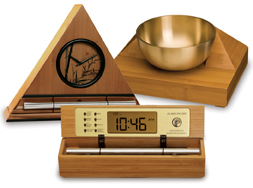 Meditation Timers and Clocks -- From Now & Zen adapted from SFgate.com by Mark Morford columns with inset links to related material can be found at sfgate.com/columnists/morford.
Now & Zen – The Zen Timer and Alarm Clock Store
1638 Pearl Street
Boulder, CO 80302
(800) 779-6383
Posted in Bamboo Chime Clocks, Meditation Timers, Meditation Tools, mindfulness practice, Yoga Timer, Zen Timers
 Are You Tired and Grouchy? Sharaku Toshusai, The actor Matsumoto Yonesaburo as Shinobu A new poll on sleep habits suggests that millions of Americans are in a bad mood, short-tempered and prone to overeat because they are tired.
The National Sleep Foundation Poll, released today, finds that people say they’re much or somewhat more likely to make mistakes, get impatient or aggravated when waiting, or get upset with their children or others when they haven’t gotten enough sleep.
One fourth said they were more likely to eat more than usual on days when they didn’t get enough sleep, with slightly more women than men reporting this was common.
The poll establishes a link between how Americans sleep and “their overall behavior, mood and performance,” said Richard Gelula, the foundation’s executive director. “It shows ‘you are how you sleep.’ And it indicates that some of the problems that we face as a society, from road rage to obesity, may be linked to lack of sleep or poor sleep.”
The foundation, an independent, nonprofit organization researches sleep problems. It has conducted a poll on sleep habits each year since 1998, part of a springtime sleep-awareness campaign tied to the return of daylight- savings time, which begins Sunday.
The poll of 1,010 adults, taken between October and early December, found that nearly a quarter felt they weren’t getting the minimum amount of sleep they need to be alert the next day. Thirty-seven percent said they are so sleepy during the day that it interferes with their activities a few days each month; 16 percent said they experience this level of fatigue at least a few days a week.
Overall, sleep habits have remained fairly steady since the poll began, but the number of people reporting they sleep less than six hours a night both on weekdays and weekends rose slightly last fall, to 15 percent and 10 percent, respectively. On average, people say they are sleeping an average of 6.9 hours on weeknights and 7.5 hours on weekends.
Adults living in the West were more likely to get eight hours or more sleep on a workday than those living in the Midwest, South and Northeast.
Those who got fewer than six hours of sleep on weekdays were twice as likely to describe themselves as stressed or sad.
 Sleep habits may contribute to your bad mood And people who reported often being sleepy during the day were considerably more likely than those who were never or rarely sleepy to describe themselves as dissatisfied with life (21 percent versus 7 percent) or angry (12 percent versus 4 percent).
More than half of those surveyed said they experience symptoms of insomnia a few nights a week or more; 37 percent said they snore frequently and 1 in 10 experiences pauses in breathing while sleeping.
Boulder, Colorado—an innovative company has taken one of life’s most unpleasant experiences (being startled awake by your alarm clock early Monday morning), and transformed it into something to actually look forward to. “The Zen Alarm Clock,” uses soothing acoustic chimes that awaken users gently and gradually, making waking up a real pleasure.
Rather than an artificial recorded sound played through a speaker, the Zen Clock features an alloy chime bar similar to a wind chime. When the clock’s alarm is triggered, its chime produces a long-resonating, beautiful acoustic tone reminiscent of a temple gong. Then, as the ring tone gradually fades away, the clock remains silent until it automatically strikes again three minutes later. The frequency of the chime strikes gradually increase over ten-minutes, eventually striking every five seconds, so they are guaranteed to wake up even the heaviest sleeper. This gentle, ten-minute “progressive awakening” leaves users feeling less groggy, and even helps with dream recall.
adapted from SFgate.com, by Lee Bowman, Scripps Howard News Service
 The Zen Alarm Clock transforms mornings, awakening you gradually with a series of gentle acoustic chimes Once you use a Zen Clock nothing else will do Now & Zen – The Zen Alarm Clock Store
1638 Pearl St.
Boulder, CO 80302
(800) 779-6383
Posted in Uncategorized
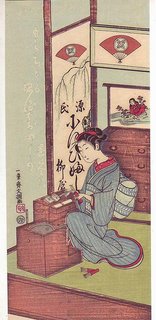 the more you sleep, the longer you live... It’s done in bed, it feels great and most Americans don’t get enough of it. It’s sleep, of course, the most undervalued contributor to optimum health and performance.
Did you know that sleep had anything to do with success in sticking to a diet? Get to know leptin and ghrelin. They sound like a Hungarian comedy act, but they are hormones that regulate appetite. Ghrelin is produced in the stomach and signals the brain when it’s time to eat. Leptin is secreted by adipose tissue (i.e., fat) and has the reverse effect, telling your brain when you are full. Chronic lack of sleep increases ghrelin and decreases leptin, leading you to feel hungry when you don’t really need to eat and to keep eating after you have gotten the calories you need.
Hitting the weights at the gym? Good sleep will bring you the results you want more quickly. The body repairs itself, including rebuilding your sore biceps, during the deepest phase of sleep. That’s why a good night’s sleep will not only make your workouts more productive but will also boost your immune system in general.
Despite these and other benefits, including greater mental alertness, improved concentration, better mood – even lower risk of car accidents – sleep remains underrated when it comes to health promotion. Maybe people can’t believe that something as mundane as consistently getting seven or eight hours of sleep a night can have such a positive impact on their health. Or maybe, in a culture of double cappuccinos and Ambien, sleep deprivation goes unrecognized in the first place.
If you get stuck in a period of weeks or even months where sleep is hard to come by (e.g., new baby, a big work deadline), pay off your sleep debt with extra sleep as soon as you can and you should suffer no long-term ill effects. But don’t make sleep deprivation a lifelong habit. A study of almost 7,000 Alameda County residents, over a nine-year period, found that people who routinely slept six or fewer hours a night had about 70 percent higher risk of dying than did people of similar age who slept seven or eight hours a night.
 choose deep and tranquil sleep - get a soothing chime alarm clock There are many common sense ways to make it easier to get to sleep, including keeping to a consistent schedule and avoiding big meals, caffeine and intense exercise just before bed. A full list of strategies is available from the National Institutes of Health at www.nhlbi. nih.gov/health/public/sleep/healthy sleepfs.pdf.
The Institute’s strategies for better sleep are useful, but they work only if you make sleep a priority, which many people in the compulsively busy Bay Area do not. If you think you don’t have time to sleep enough, remember that survey research shows that most people grossly underestimate how much time gets away from them in the evenings when they are idly surfing the Net or half-watching TV. If you feel tired, turn off the machines and go to bed. And if you believe you absolutely must see the next episode of “Big Brother” or a rerun of “Gilligan’s Island,” remember that TiVo and VCRs were invented so that we can watch such programs later, when we are rested enough to appreciate their nuanced messages and enduring contributions to our culture.
adapted from SFgate.com, by Dr. Keith Humphreys
One of the ultimate Zen like experiences is waking-up from a great slumber refreshed and energized. Your mind and body are harmoniously one, both alert and focused. Having a refreshed mind and body are two keys to a natural and Zen lifestyle. Waking up in the morning should not be a loud and abrupt awakening, but rather it should be a peaceful positive experience. The right natural alarm clock can transition your deep and tranquil sleep into a serene start to consciousness. Imagine a long-resonating Tibetan bell-like chime waking you up to a beautiful morning experience.
The right alarm clock can be the most beneficial investment for you. With our Now & Zen natural alarm clock you are awakened more gradually and thus more naturally. Now & Zen is focused on creating a naturalistic lifestyle, and our clocks are an example of our philosophy.
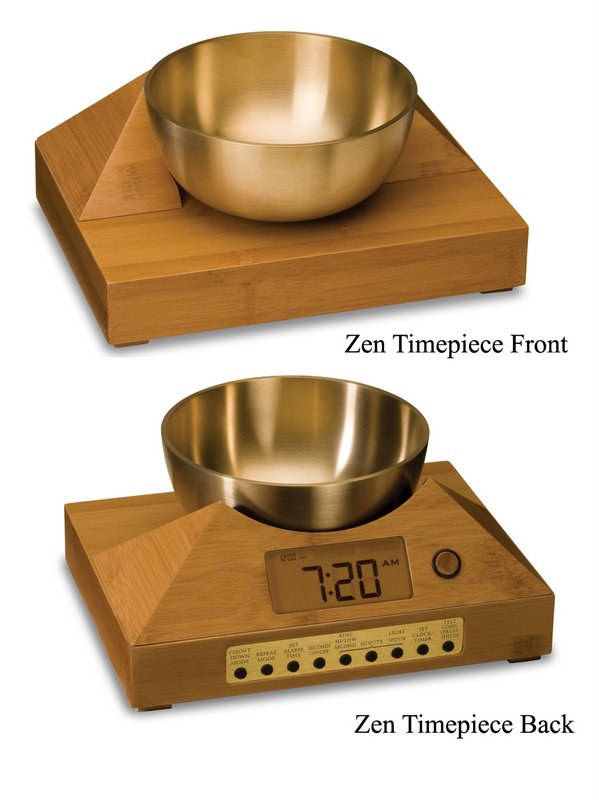 Choose the Gentle Chime Alarm Clock Now & Zen – The Gentle Chime Alarm Clock Store
1638 Pearl Street
Boulder, CO 80302
(800) 779-6383
Posted in Bamboo Chime Clocks, sleep, Sleep Habits, Zen Timers
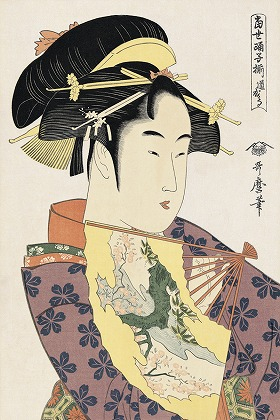 Sleep to Remember - Utamaro Kitagawa, Dojoji Dancer Just in time for the holidays, some medical advice most people will like: Take a nap.
Interrupting sleep seriously disrupts memory-making, compelling new research suggests. But on the flip side, taking a nap may boost a sophisticated kind of memory that helps us see the big picture and get creative.
“Not only do we need to remember to sleep, but most certainly we sleep to remember,” is how Dr. William Fishbein, a cognitive neuroscientist at the City University of New York, put it at a meeting of the Society for Neuroscience last week.
Good sleep is a casualty of our 24/7 world. Surveys suggest few adults attain the recommended seven to eight hours a night.
Over time, a chronic lack of sleep can erode the body in ways that leave us more vulnerable to heart disease, diabetes and other illnesses.
But perhaps more common than insomnia is fragmented sleep – the easy awakening that comes with aging, or, worse, the sleep apnea that afflicts millions, who quit breathing for 30 seconds or so over and over throughout the night.
Indeed, scientists increasingly are focusing less on sleep duration and more on the quality of sleep, what’s called sleep intensity, in studying how sleep helps the brain process memories so they stick. Particularly important is “slow-wave sleep,” a period of very deep sleep that comes earlier than better-known REM sleep, or dreaming time.
Fishbein suspected a more active role for the slow-wave sleep that can emerge even in a power nap. Maybe our brains keep working during that time to solve problems. He and graduate student Hiuyan Lau devised a simple test: documenting relational memory, where the brain puts together separately learned facts in new ways.
 Sleep to Remember - Choose a Gentle Chime Alarm Clock First, they taught 20 English-speaking college students lists of Chinese words spelled with two characters. Half the students took a nap, being monitored to be sure they didn’t move from slow-wave sleep into the REM stage.
Upon awakening, they took a multiple-choice test of Chinese words they’d never seen before. The nappers did much better at automatically learning that the first of the two-pair characters in the words they’d memorized earlier always meant the same thing – female, for example. So they also were more likely than nonnappers to choose that a new word containing that character meant “princess” and not “ape.”
“The nap group has essentially teased out what’s going on,” Fishbein concludes.
These students took a 90-minute nap, quite a luxury for most adults. But even a 12-minute nap can boost some forms of memory, adds Dr. Robert Stickgold of Harvard Medical School.
Conversely, Wisconsin researchers briefly interrupted nighttime slow-wave sleep by playing a beep – just loudly enough to disturb sleep but not awaken – and found those people couldn’t remember a task they’d learned the day before as well as people whose slow-wave sleep wasn’t disrupted.
That brings us back to fragmented sleep, whether from aging or apnea. It can suppress the birth of brain cells in the hippocampus, where memory-making begins – enough to hinder learning weeks after sleep returns to normal, warns Dr. Dennis McGinty of UCLA.
To prove a lasting effect, McGinty mimicked human sleep apnea in rats. He hooked them to brain monitors and made them sleep on a treadmill. Whenever the monitors detected 30 seconds of sleep, the treadmill briefly switched on. After 12 days of this sleep disturbance, McGinty let the rats sleep peacefully for the next two weeks. The catch-up sleep didn’t help.
adapted from SFGate.com, auran Neergaard, Associated Press
One of the ultimate Zen like experiences is waking-up from a great slumber refreshed and energized. Your mind and body are harmoniously one, both alert and focused. Having a refreshed mind and body are two keys to a natural and Zen lifestyle. Waking up in the morning should not be a loud and abrupt awakening, but rather it should be a peaceful positive experience. The right natural alarm clock can transition your deep and tranquil sleep into a serene start to consciousness. Imagine a long-resonating Tibetan bell-like chime waking you up to a beautiful morning experience.
The right alarm clock can be the most beneficial investment for you. With our Now & Zen natural alarm clock you are awakened more gradually and thus more naturally. Now & Zen is focused on creating a naturalistic lifestyle, and our clocks are an example of our philosophy.
 Wake up with gradual, beautiful acoustic chimes. The Zen Alarm Clock transforms your mornings and gets you started right, with a progressive awakening Now & Zen – The Zen Alarm Clock Store
1638 Pearl Street
Boulder, CO 80302
(800) 779-6383
Posted in Bamboo Chime Clocks
 Choose a Gentle Chime Alarm Clock - Eisen Keisai, Woman Getting out of a Mosquito Net When his clock-radio goes off at 7 a.m., David Epstein’s latest wake- up strategy roars into high gear: He stumbles out of bed, walks across the room and pushes the snooze button. Then he climbs back between the sheets.
A few minutes later, his travel clock rings. He presses snooze and rolls over for more sleep — until the alarm on his BlackBerry goes off. Sitting up, he punches keys to reset it for 10 more minutes; then it’s back to the pillow.
The pattern repeats amid a cacophony of assorted rings until his real wake-up time, 8 a.m.
In a nation that clocks around six to seven hours of sleep a night when an average of eight hours is recommended, it is a rare person who wakes up without an alarm. And because it is usually a struggle, pushing “snooze” to delay the day has become as much a part of the wake-up ritual as a cup of coffee.
But is a bumpy arousal for 30, 60 or even 90 minutes a way to recoup much- needed sleep? Or is it a recipe for exhaustion?
Although scientists have not specifically tackled the question, sleep researchers agree that short bouts of sleep are far from ideal. The restorative value of rest is diminished, especially when the increments are short, said Dr. Edward Stepanski, who has studied sleep fragmentation at the Rush University Medical Center in Chicago. And a teeter-totter effect of dozing and waking causes shifts in the brain-wave patterns.
“Even a subtle noise that doesn’t actually wake you up is disruptive enough to affect the sleep quality,” Stepanski said. “That’s why someone who falls asleep with the TV on may wake up exhausted. So, if a person is rousing themselves enough to reset a clock, there’s likely to be an even more profound effect.”
 Banish the Snooze Button -- Choose a Gentle Chime Alarm Clock It is an axiom of sleep research that not all sleep is equal. A night’s sleep is divided into five continually shifting stages, defined by types of brain waves that reflect either lighter or deeper sleep. Toward morning, there is an increase in rapid eye movement, or REM sleep, when the muscles are relaxed and dreaming occurs, and recent memories may be consolidated in the brain. Sleep-deprived snooze-button addicts are likely to cut short their quota of REM sleep, impairing their mental functioning during the day.
How tired a person is when the snooze-button frenzy begins is important, experts say. Someone who got a full eight hours of sleep may push the snooze button, but won’t nod off again very easily, Stepanski said. And some people seem to be more tolerant of short-term sleep loss.
But the person who has been getting too little sleep for too long may be a wreck, especially by Friday after racking up a large sleep debt during the week.
To complicate matters, feeling alert is not just a matter of getting the right dose of different kinds of sleep. The body has its own alarm clock, a circadian rhythm in which fluctuations in hormones like cortisol, melatonin, ghrelin and growth hormone regulate sleepiness and alertness, as well as other body functions.
And sleep patterns can run on a schedule different from a person’s body clock. Trying to sneak in more sleep when someone is used to getting up early can cause the body to switch to an alert mode, making any extra sleep light and fragmented, said Dr. Timothy Roehrs, the director of research at the Sleep Disorders and Research Center at Henry Ford Hospital in Detroit.
On the other hand, if someone’s body is on a later cycle from habitually staying up late, waking up early is that much harder because the body is not yet pumping out peak levels of cortisol and other hormones that help wake people up.
Still, most hard-working people cope, managing to live in what researchers agree is a perpetual sleep-deprived state.
They mask fatigue by keeping themselves alert with a variety of stimuli, like caffeine, exercise or simply keeping busy. Some people with sleep debts do not consider themselves tired, believing that they are functioning normally, said Dr. David Dinges, chief of the sleep and chronobiology division at the University of Pennsylvania School of Medicine.
But evidence is mounting on the behavioral risks of long-term partial sleep deprivation. Not getting enough sleep day after day takes its toll. And it is not only medical interns and truck drivers doing double shifts who can suffer from serious mistakes at work because of it.
In the August issue of the journal Sleep, Roehrs published one of the first studies to measure the effect of sleepiness on decision making and risk taking.
Roehrs and his colleagues paid sleepy and fully alert subjects to complete a series of computer tasks. At random times, they were given a choice to take their money and stop. Or they could forge ahead with the potential of either earning more money or losing it all if their work was not completed within an unknown remainder of time.
“The alert people were very sensitive to the amount of work necessary to finish and the risk of losing their money if they didn’t,” Roehrs said. “The more work they had, the more apt they were to stop. Without fail, the sleepy people chose to quit when it was optimal to continue, and they gambled losing it all by trying to finish the task for more money even when it was 100 percent likely that they would be unable to finish.”
Numerous studies have documented sleep impairments on memory, reaction time, comprehension and attention. Even emotional states can be affected. One of the first signs of sleep debt is irritability and increased depression, said Dr. Arthur Spielman, a professor of psychology and sleep researcher at City College of New York.
So what is a sleepy person to do? Start paying back sleep debt, for starters, experts say. Turn off David Letterman and get to bed half an hour earlier. Night owls who do not feel sleepy should cut off the stimulation: turn off the lights and television and lie in bed with closed eyes for one minute to unmask their sleepiness, Spielman recommended.
He added that those who still found it hard to get to sleep early at night should wake up early and experience morning light to reset the body clock.
After a couple of weeks, they will feel more tired in the evening and go to sleep earlier, making it easier to get up the next day, he added.
And come morning, setting the clock for only 10 minutes earlier than the optimal wake-up time, allowing for only a single opportunity to press the snooze button, will provide the most restorative period of solid sleep.
Of course, waking at the last possible minute requires a leap of faith.
“I’m not convinced that this would work, because I don’t trust myself to get up,” Epstein admitted. “Besides, I like to ease myself out of bed. When that alarm rings, I would sell my soul for an extra 15 minutes of sleep.
“So, by setting my clocks an hour earlier, I get to wake up and know that I can go back to bed. It feels really good.”
Have no fear – there is an Alternative to the Snooze Button — Choose the built-in Snooze – a Gradual, Soothing Chime Alarm Clock
Now & Zen ® creates natural lifestyle products that make a real difference in people’s lives. The growing preference for natural foods and natural fibers is carried forward by Now & Zen® in the natural acoustic sounds and natural hardwood materials featured in every Now & Zen® product. With a selection of different styles, these unique alarm clocks wake you gradually and naturally. A series of acoustic bell-like chimes transforms your daily arrival into a tranquil beginning. Each timepiece combines beauty and versatility. These are high quality products that are not only modern and luxurious but are also peaceful and add to a stress-free day in an already stress filled world.
adapted from SFgate.com, by Martica Heaner, New York Times
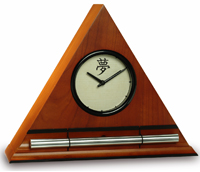 Gradual Chime Alarm Clock with Soothing Sounds Now & Zen – The Zen Alarm Clock Store
1638 Pearl Street
Boulder, CO 80302
(800) 779-6383
Posted in Uncategorized
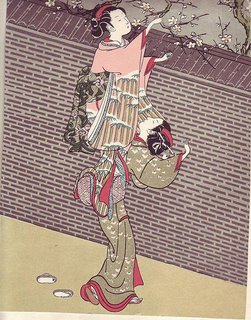 Utamaro Ukiyo-e, Two Ladies With Flowers The “Floating World” described the urban lifestyle, especially the pleasure-seeking aspects, of the Edo-period Japan (1600 –1867).
The term is also an ironic allusion to the homophone (the same as another word but differs in meaning) “Sorrowful World”, the earthly plane of death and rebirth from which Buddhists sought release.
The contemporary novelist Asai Ryoi, in his Ukiyo monogatari (“Tales of the Floating World”, c. 1661), provides some insight into the concept of the floating world:
… Living only for the moment, turning our full attention to the pleasures of the moon, the snow, the cherry blossoms and the maple leaves; singing songs, drinking wine, diverting ourselves in just floating, floating; … refusing to be disheartened, like a gourd floating along with the river current: this is what we call the floating world…
Ukiyo floating world adapted from wikipedia.org
One of the ultimate Zen like experiences is waking-up from a great slumber refreshed and energized. Your mind and body are harmoniously one, both alert and focused. Having a refreshed mind and body are two keys to a natural and Zen lifestyle. Waking up in the morning should not be a loud and abrupt awakening, but rather it should be a peaceful positive experience. The right natural alarm clock can transition your deep and tranquil sleep into a serene start to consciousness. Imagine a long-resonating Tibetan bell-like chime waking you up to a beautiful morning experience.
The right alarm clock can be the most beneficial investment for you. With our Now & Zen natural alarm clock you are awakened more gradually and thus more naturally. Now & Zen is focused on creating a naturalistic lifestyle, and our clocks are an example of our philosophy.
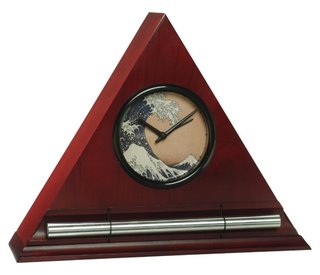 Meditation Clock Timer- Zen Alarm Clock, Ukiyo-e Hokusai Wave Dial Face Now & Zen – The Zen Alarm Clock Store
1638 Pearl St.
Boulder, CO 80302
(800) 779-6383
Posted in Beauty, Cherry Blossoms, Chime Alarm Clocks, Hokusai Wave, Japanese Inspired Zen Clocks, Meditation Timers, Meditation Tools, Now & Zen Alarm Clocks, Progressive Awakening, Zen Timers
 koi fishes in the pond Koi or more specifically nishikigoi, (literally “brocaded carp”), are ornamental domesticated varieties of the common carp (Cyprinus carpio) that are kept for decorative purposes in outdoor ponds and water gardens. They are also called Japanese carp.
adapted from wikipedia.org
One of the ultimate Zen like experiences is waking-up from a great slumber refreshed and energized. Your mind and body are harmoniously one, both alert and focused. Having a refreshed mind and body are two keys to a natural and Zen lifestyle. Waking up in the morning should not be a loud and abrupt awakening, but rather it should be a peaceful positive experience. The right natural alarm clock can transition your deep and tranquil sleep into a serene start to consciousness. Imagine a long-resonating Tibetan bell-like chime waking you up to a beautiful morning experience.
The right alarm clock can be the most beneficial investment for you. With our Now & Zen natural alarm clock you are awakened more gradually and thus more naturally. Now & Zen is focused on creating a naturalistic lifestyle, and our clocks are an example of our philosophy.
 mindful of the koi
Now & Zen – The Zen Alarm Clock Store
1638 Pearl Street
Boulder, CO 80302
(800) 779-6383
Posted in Chime Alarm Clocks, Now & Zen Alarm Clocks, Progressive Awakening, Zen Timers
 why we need the sun The sun is the center of our lives. It gives us day and night, seasons, light, heat, colors, wind, plant life, moonlight and a sense of direction and time of day—not to mention awesome sunrises and sunsets. Solar heating, daylighting, and solar electricity reduce our dependence on nonrenewable energy sources. And the absence of sunshine can be debilitating, as any sufferer of Seasonal Affective Disorder (SAD) can attest. Yet sunlight can degrade fabrics, overheat our homes, encourage cataracts, and cause our skin to age and develop cancer. We are urged to go outside only under cover of hats, sunglasses, sunscreens, and tightly woven fabrics. What we rarely hear is that sunshine is also an important element of good health.
Why we need sunlight
According to Zane Kime, M.D., M.S., in Sunlight (World Health Publications, 1980), the ultraviolet (UV) portion of sunlight helps our heart, blood chemistry, immune system, energy level, and sex life, while its absence weakens our body’s systems and contributes to disease. Furthermore, we rely on the sun’s daily and annual cycles to regulate such bodily functions as heart rate, blood pressure, hormone levels, metabolism, and immunity. When modern living throws our biological rhythms out of synch with solar rhythms, the results can be fatigue, depression, insomnia, digestive problems, poor coordination, loss of mental ability, and loss of sex drive and fertility.
Sunlight also improves our attitudes and behavior. Studies have shown that students in daylit schoolrooms performed markedly better than their non-daylit peers. Daylit retail stores experienced increased sales, less absenteeism among employees, and fewer employee mistakes. One survey of indoor workers, from warehouse employees to upper management, found a strong correlation between job satisfaction and the amount of sunlight entering the workspace. There’s even a link between sunny mornings and positive stock market returns.
In addition to its health effects, we can all benefit from developing a richer relationship with the sun. Do you awaken gradually in the mornings with sunlight, or does an alarm clock interrupt your sleep cycles? Does sunshine enter the rooms where you spend your days? Do you get outdoors with some skin exposed every day? Do you notice that the color of the sun’s light is different in the morning, noon, and evening—different in summer and winter? Do you notice the sun’s path being higher in summer than in winter? Do you watch the sun rise or set?
If your life is less than sun-kissed, here are some suggestions. Learn to identify the compass directions, and observe the sun’s path across the sky regularly. Notice where sunlight falls at various times of day in your home, yard, and workplace. As appropriate, move furniture to bring your activities closer to daylight. Create a sculpture or sundial that makes the sun’s motion visible. Grow plants. Rise with the sun and slow down after sunset. Move some activities outdoors. Cultivate a life within walking distance of home. Listen to your body and mind to create your own right relationship with the sun.
CAROL VENOLIA is an architect, author of Healing Environments: Your Guide to Indoor Well-Being.
adapted from Natural Home Magazine, July/August 2002
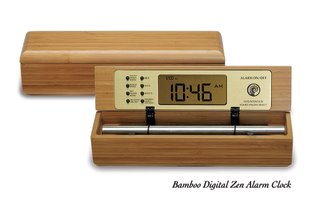 Portable Meditation Timer and Yoga Clock Use our unique “Zen Clock” which functions as a Yoga & Meditation Timer. It features a long-resonating acoustic chime that brings your meditation or yoga session to a gradual close, preserving the environment of stillness while also acting as an effective time signal. Our Yoga Timer & Clock can be programmed to chime at the end of the meditation or yoga session or periodically throughout the session as a kind of sonic yantra. The beauty and functionality of the Zen Clock/Timer makes it a meditation tool that can actually help you “make time” for meditation in your life. Bring yourself back to balance.
 alarm clocks with chime for a gentle awakening
Now & Zen – The Zen Timer & Alarm Clock Store
1638 Pearl Street
Boulder, CO 80302
(800) 779-6383
Posted in Well-being
|
|
|
|